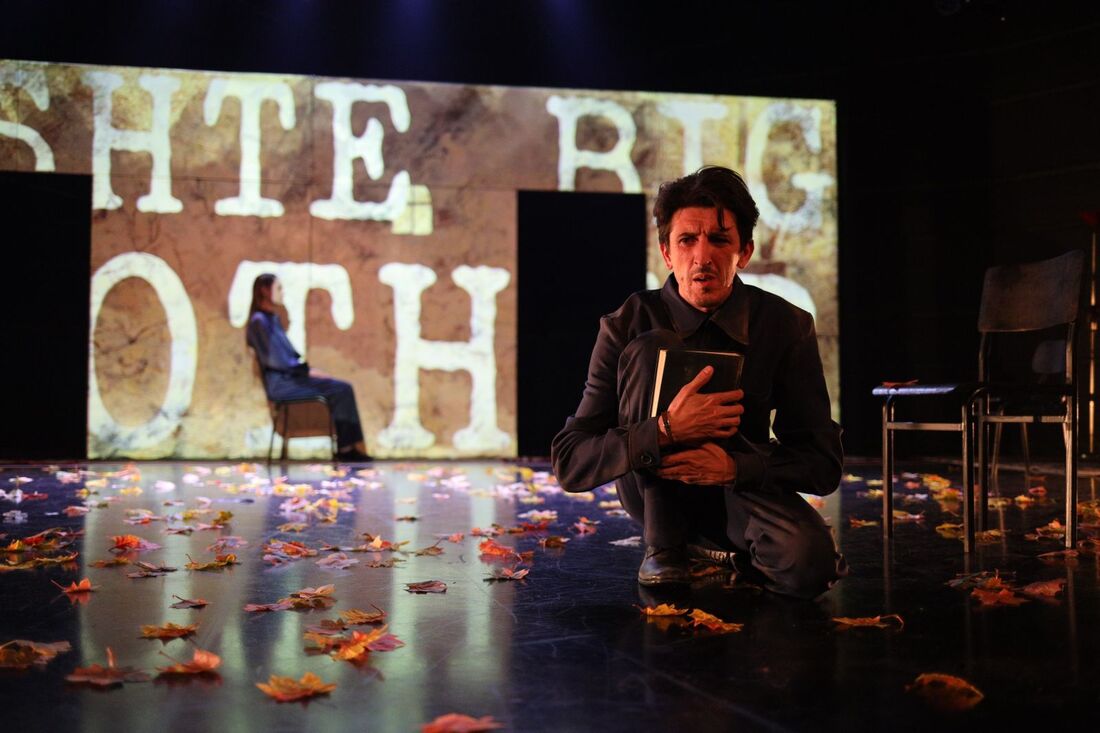Reviewed by Delvis BejleriIt seemed to me that the main theme in this show was forbidden love in a rotten system in which the individual was valued only for their labour.
In this adaptation of the novel by George Orwell by director Igor Mendijsky, the figure of “Big Brother” illustrated the concept of being constantly observed and the use of brainwashing by the state. For me, one of the most impressive aspects of the production, was the director's treatment of the author's presence within their own narrative. George Orwell was there on stage throughout, performed by a woman, Arta Selimi, which gave us the idea that even though an author dies, he still continues creating, in this case through the transforming of a book into a theatre play. It also shows Orwell’s suffering during the creating process, bringing another dimension to the show. The figure of the leader, played by the actor Adrian Morina, dominates the show. At the beginning of the play, he came across as TV presenter, making the piece feel current and accessible to the public. He then becomes a collaborator in the tasks given to the other actors and finally he transforms into an "intellectual monster". Winston, played by the actor Ylber Bardhi, on the other hand, was the personification of freedom in this darkness system in which they live, but knowing Bardhi's work, I thought he was having a hard time with this character. In my opinion, his struggle was noticeable because he mostly plays comical roles and is well suited to comedy as a performer. As a result, Morina comes to feel like the main character because he is confident in this particular role of leader. Winston's lover Julia, played by Flaka Latifi, was a strong, rebellious character and Latifi clearly transmitted Julia's desire to live her life as she wanted, regardless of the circumstances in which they found themselves or the approach of those around them. The feelings and emotions Latifi exhibited during the performance felt sincere and organic. What was noticeable to me during the show was a lack of rhythm. Often it felt to me as the performers confused the tempo with the rhythm. This sense of rhythm is necessary in order not to lose the focus or attention of the public and often it was lost. As director Mendjisky, may be blamed for this issue, but this shouldn't detract from his significant work. For me, it was the time period shifts and the use of the camera which made this show remarkable. The interaction between performers and the audience, taking personal information from the public and recording them, felt unnecessary. It was a great symbol of being observed by the government but this interaction felt jarring, more like something you would encounter in ‘stand up’. In contrast, the symbolism of the character dressing as a pig, showing opposition to the orders given by the government hit much harder - it was a creative approach to this topic. The way the performance showed Orwell's creative process and showed how her suffering was coherent with the suffering of the characters, was also worthy and interesting. It allowed us to feel the struggle that Orwell faced to create the masterpiece 1984. Director: Igor Mendjisky//Scenographer: Mentor Berisha//Costume: Yllka Brada//Compser: Trimor Dhomi//Video: Yannik Donet//Translated by: Urim Nerguti Actors: Flaka Latifi, Ylber Bardhi, Adrian Morina, Arta Selimi, Basri Lushtaku, Edona Reshitaj, Shpejtim Kastrati and Xhejlane Godanci.
0 Comments
Leave a Reply. |
Kosovo Theatre ReviewsReviews and creative responses to theatre productions in Kosovo Archives
November 2022
Categories |

 RSS Feed
RSS Feed
